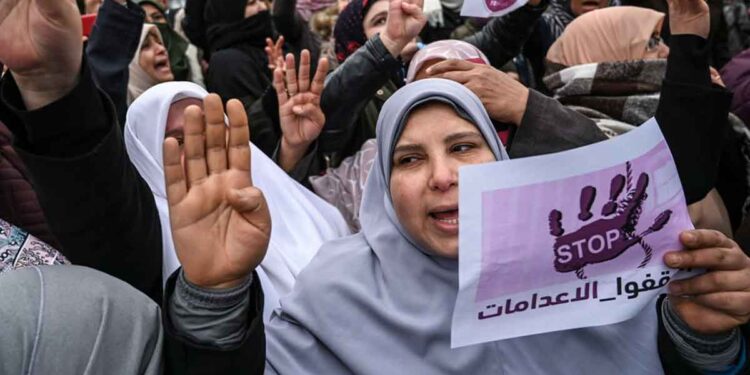On Tuesday, an Egyptian court referred the papers of nine prisoners of conscience to the Grand Mufti for his decision on their execution, in a case related to Rabaa sit-in dispersal in 2013.
According to Egyptian media outlets, The Minya Criminal Court decided to refer the papers of six defendants -three of them in absentia- to the Mufti to decide on their execution. The court set September 3, 2021, to pronounce the verdict.
According to Egyptian law, the opinion of the Mufti is advisory and not mandatory, while the defendants have the right to appeal the decision before the Court of Cassation within 60 days of the issuance of the verdict.
The defendants face charges of “riots and violence in the village of Delga in Minya governorate, the killing of a Christian citizen and the burning of a church following the dispersal of Rabaa and Al-Nahda sit-ins,”, however, defendants have denied these charges.
37 others were sentenced to life imprisonment for 25 years, both in absentia and in presence, in the same session.
The court also sentenced five other defendants, two in the presence and three in absentia, to imprisonment for five years each.
The number of defendants, in this case, is 48, including 20 detainees who were referred to the Criminal Court in late 2015.
In the same context; The Minya Criminal Court referred the papers of three defendants to the Mufti for his opinion on their execution in the retrial of the case of Samalut Police Station incidents in Minya, following the dispersal of the Rabaa and Al-Nahda sit-ins. The court set August 3, 2021, for the issuance of the verdict.
The dispersal of Rabaa and Al-Nahda sit-ins resulted in 632 deaths, including 8 policemen, according to the governmental report of the National Council for Human Rights in Egypt, at a time when local and international human rights organisations confirmed that the number of victims exceeded 1,000.
The Egyptian Court of Cassation had recently issued a final death sentence against 12 prominent opposition leaders in the Rabaa dispersal case, two months before the eighth anniversary of the massacre that took place on August 14, 2013, which is considered as a new crime added to the mass killing committed by the Egyptian army and police forces against more than a thousand Egyptian citizens on one day.
On June 24 last year, Arab Organisation for Human Rights in the UK (AOHR UK) held an online seminar entitled “Stop Executions in Egypt” in the presence of parliamentarians, activists, and human rights defenders to discuss proposed solutions to halt the execution of death sentences in Egypt.
AOHR UK stressed that the international silence allowed those responsible for the Rabaa massacre to escape punishment and encouraged them to move forward with more death sentences to crush dissent and silence any voice calling for justice or change.
In a statement, AOHR UK called on all civil society organisations around the world to pressure their governments to take serious stances with the Egyptian regime, which committed the most heinous crimes and whose criminal officials are enjoying full impunity.






























